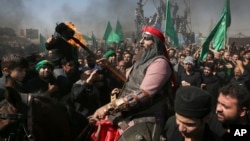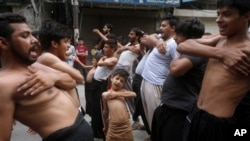Videos have surfaced in Iran of the month of Muharram memorial services, revealing religious singers, known as eulogists, and mourners embracing an approach that deviates from the Islamic Republic's expectations. The head of the Society of Seminary Teachers in Qom has voiced criticism toward specific religious programs, pointing out that some elegies appear to be "celebrating the enemy."
Domestic media report cleric Hashem Hosseini Bushehri, the head of the Society of Seminary Teachers in Qom and former head of the country's seminaries, criticized some of the mourners, saying their eulogies about the third Shia Imam seemed to bring "joy to the enemy" because of their content and approach.
Muharram is a 10-day period when Muslims mourn the martyrdom of Hazrat Imam Hussain, son of Hazrat Ali, and grandson of Prophet Muhammad.
In the past few days, as the month of Muharram began, video of mourning gatherings has surfaced on social media showcasing eulogies and poems expressing protest and dissent.
In the videos from several Iranian cities, some eulogists protested recent casualties, the government's treatment of those opposing compulsory hijab wearing, increasing poverty and soaring prices. The attendees actively participated in the protest by echoing the verses and supporting the eulogists' sentiments.
Bushehri said these individuals were engaged in a practice of "chest-beating" that is being portrayed negatively by foreign media.
Gholamali Koveitipoor, a celebrated religious eulogist known for works like "Auntie, Where is My Dad?" and a singer of powerful pieces like "Comrades So Innocent," recently unveiled a thought-provoking creation titled "Leader." In one segment of that piece, he voices, "Here, they are tearing apart all the young people, Haji."
In certain cities, mourners have chosen to deviate from official customs of the Islamic Republic during ceremonies. In Zanjan, for instance, mourners showed restraint by not walking on American and Israeli flags, which is common in other cities and regions.
The supreme leader of the Islamic Republic, Ali Khamenei, met last January with a group of eulogists amid nationwide protests. During the meeting, he highlighted the eulogists' significant role in inspiring young people to participate in the battlefronts during the Iran-Iraq war and their involvement in suppressing 2009 protests.
He emphasized the need for eulogists to be aware of their stance and serve the revolution by contributing to the expansion of the struggle, which also involves standing against oppressive forces.
Some of those protesting now and celebrating Muharram are ignoring his words.





